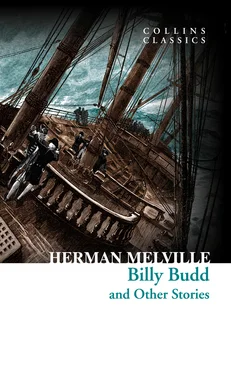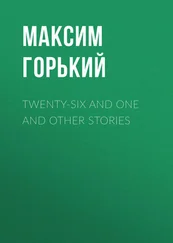For the first time in my life a feeling of overpowering stinging melancholy seized me. Before, I had never experienced aught but a not unpleasing sadness. The bond of a common humanity now drew me irresistibly to gloom. A fraternal melancholy! For both I and Bartleby were sons of Adam. I remembered the bright silks and sparkling faces I had seen that day, in gala trim, swan-like sailing down the Mississippi of Broadway; and I contrasted them with the pallid copyist, and thought to myself, Ah, happiness courts the light, so we deem the world is gay; but misery hides aloof, so we deem that misery there is none. These sad fancyings—chimeras, doubtless, of a sick and silly brain—led on to other and more special thoughts, concerning the eccentricities of Bartleby. Presentiments of strange discoveries hovered round me. The scriveners pale form appeared to me laid out, among uncaring strangers, in its shivering winding sheet.
Suddenly I was attracted by Bartleby’s closed desk, the key in open sight left in the lock.
I mean no mischief, seek the gratification of no heartless curiosity, thought I; besides, the desk is mine, and its contents, too, so I will make bold to look within. Everything was methodically arranged, the papers smoothly placed. The pigeon holes were deep, and removing the files of documents, I groped into their recesses. Presently I felt something there, and dragged it out. It was an old bandanna handkerchief, heavy and knotted. I opened it, and saw it was a savings’ bank.
I now recalled all the quiet mysteries which I had noted in the man. I remembered that he never spoke but to answer; that, though at intervals he had considerable time to himself, yet I had never seen him reading—no, not even a newspaper; that for long periods he would stand looking out, at his pale window behind the screen, upon the dead brick wall; I was quite sure he never visited any refectory or eating house; while his pale face clearly indicated that he never drank beer like Turkey, or tea and coffee even, like other men; that he never went anywhere in particular that I could learn; never went out for a walk, unless, indeed, that was the case at present; that he had declined telling who he was, or whence he came, or whether he had any relatives in the world; that though so thin and pale, he never complained of ill health. And more than all, I remembered a certain unconscious air of pallid—how shall I call it?—of pallid haughtiness, say, or rather an austere reserve about him, which had positively awed me into my tame compliance with his eccentricities, when I had feared to ask him to do the slightest incidental thing for me, even though I might know, from his long-continued motionlessness, that behind his screen he must be standing in one of those dead-wall reveries of his.
Revolving all these things, and coupling them with the recently discovered fact, that he made my office his constant abiding place and home, and not forgetful of his morbid moodiness; revolving all these things, a prudential feeling began to steal over me. My first emotions had been those of pure melancholy and sincerest pity; but just in proportion as the forlornness of Bartleby grew and grew to my imagination, did that same melancholy merge into fear, that pity into repulsion. So true it is, and so terrible, too, that up to a certain point the thought or sight of misery enlists our best affections; but, in certain special cases, beyond that point it does not. They err who would assert that invariably this is owing to the inherent selfishness of the human heart. It rather proceeds from a certain hopelessness of remedying excessive and organic ill. To a sensitive being, pity is not seldom pain. And when at last it is perceived that such pity cannot lead to effectual succor, common sense bids the soul be rid of it. What I saw that morning persuaded me that the scrivener was the victim of innate and incurable disorder. I might give alms to his body; but his body did not pain him; it was his soul that suffered, and his soul I could not reach.
I did not accomplish the purpose of going to Trinity Church that morning. Somehow, the things I had seen disqualified me for the time from church-going. I walked homeward, thinking what I would do with Bartleby. Finally, I resolved upon this—I would put certain calm questions to him the next morning, touching his history, etc., and if he declined to answer them openly and unreservedly (and I supposed he would prefer not), then to give him a twenty dollar bill over and above whatever I might owe him, and tell him his services were no longer required; but that if in any other way I could assist him, I would be happy to do so, especially if he desired to return to his native place, wherever that might be, I would willingly help to defray the expenses. Moreover, if, after reaching home, he found himself at any time in want of aid, a letter from him would be sure of a reply.
The next morning came.
“Bartleby,” said I, gently calling to him behind his screen.
No reply.
“Bartleby,” said I, in a still gentler tone, “come here; I am not going to ask you to do anything you would prefer not to do—I simply wish to speak to you.”
Upon this he noiselessly slid into view.
“Will you tell me, Bartleby, where you were born?”
“I would prefer not to.”
“Will you tell me anything about yourself?”
“I would prefer not to.”
“But what reasonable objection can you have to speak to me? I feel friendly towards you.”
He did not look at me while I spoke, but kept his glance fixed upon my bust of Cicero, which, as I then sat, was directly behind me, some six inches above my head.
“What is your answer, Bartleby,” said I, after waiting a considerable time for a reply, during which his countenance remained immovable, only there was the faintest conceivable tremor of the white attenuated mouth.
“At present I prefer to give no answer,” he said, and retired into his hermitage.
It was rather weak in me I confess, but his manner, on this occasion, nettled me. Not only did there seem to lurk in it a certain calm disdain, but his perverseness seemed ungrateful, considering the undeniable good usage and indulgence he had received from me.
Again I sat ruminating what I should do. Mortified as I was at his behavior, and resolved as I had been to dismiss him when I entered my office, nevertheless I strangely felt something superstitious knocking at my heart, and forbidding me to carry out my purpose, and denouncing me for a villain if I dared to breathe one bitter word against this forlornest of mankind. At last, familiarly drawing my chair behind his screen, I sat down and said: “Bartleby, never mind, then, about revealing your history; but let me entreat you, as a friend, to comply as far as may be with the usages of this office. Say now, you will help to examine papers to-morrow or next day: in short, say now, that in a day or two you will begin to be a little reasonable:—say so, Bartleby.”
“At present I would prefer not to be a little reasonable,” was his mildly cadaverous reply.
Just then the folding-doors opened, and Nippers approached. He seemed suffering from an unusually bad night’s rest, induced by severer indigestion than common. He overheard those final words of Bartleby.
“ Prefer not , eh?” gritted Nippers—“I’d prefer him, if I were you, sir,” addressing me—“I’d prefer him; I’d give him preferences, the stubborn mule! What is it, sir, pray, that he prefers not to do now?”
Bartleby moved not a limb.
“Mr. Nippers,” said I, “I’d prefer that you would withdraw for the present.”
Somehow, of late, I had got into the way of involuntarily using this word “prefer” upon all sorts of not exactly suitable occasions. And I trembled to think that my contact with the scrivener had already and seriously affected me in a mental way. And what further and deeper aberration might it not yet produce? This apprehension had not been without efficacy in determining me to summary measures.
Читать дальше












